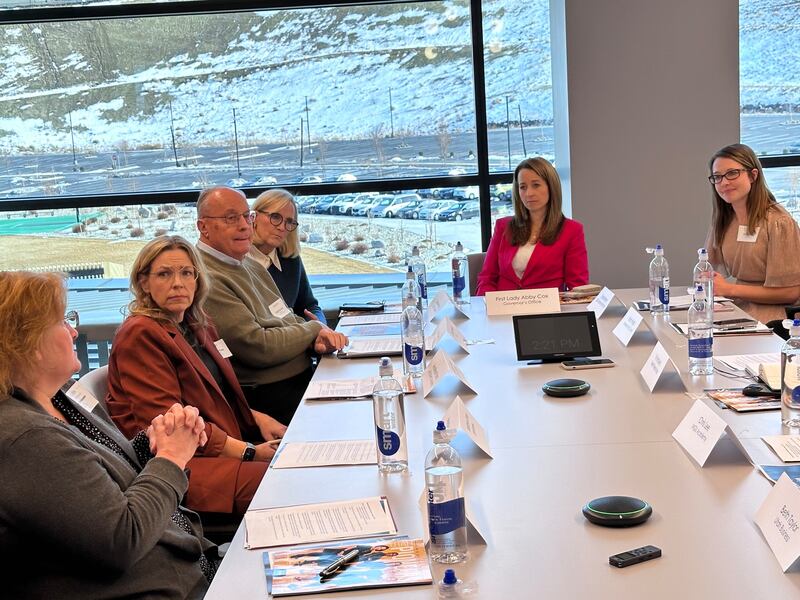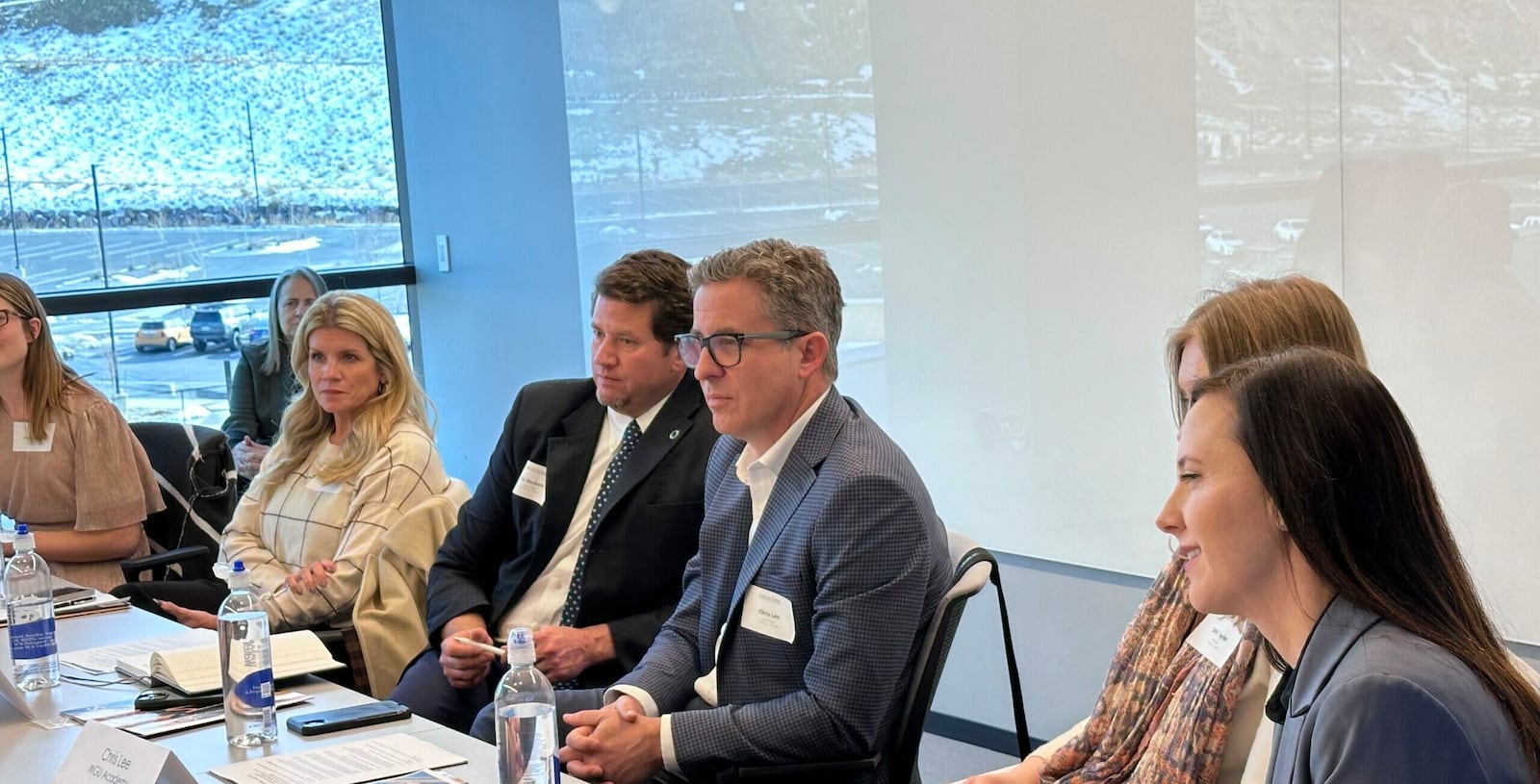Last month, Utah Business partnered with Clearlink to host a roundtable on education in Utah. Moderated by Chris Lee, president of WGU Academy at Western Governors University, they discussed retention strategies, educator-led reform, AI and more.
What currently concerns you most about education?
Christine Ivory | Co-Founder | The Clark & Christine Ivory Foundation
The thing that concerns me the most about education is the children. We’ve been doing a lot of tutoring this year at a west-side school. These children are in trouble because of their phones and access to screens. We are also running Ivory University House at the University of Utah. There, we see isolation—kids have a difficult time coming out of their rooms and really want to be alone. I’m very concerned about these children, these students, what they’re confronting, and the difficulties that they have to deal with.
Carly Maloney | 2024 Utah Teacher of the Year | Viewmont High School, Davis School District
When I asked my colleagues about their concerns, the biggest issue that was brought up was that we need to be at the table like this because we are experts. We know what is going on. Ask us because we will make the policies that are best for students. We have students’ best interests in mind.
Another concern is time and teacher-led professional development. We need to have the time and space to plan and prepare. Teacher-led professional development and teacher leadership—that can be a future of this state. Teachers are supposed to have a prep period built into their schedules to prepare and plan. We need to get away from this idea that teachers need to be “on” 24/7. It is not healthy. It’s not doing our teachers any service. It’s not doing our students any service. It is not doing our community any service. We need to get back to normalizing, taking breaks, and having that time to prepare, plan and innovate.
Kristin Wright | Programs Director | Women Tech Council
I’m passionate about education and education here in our state. My current greatest concern is that, sometimes, students don’t understand the value of the return on education.
Liz Findlay | Co-Founder | Albion Fit
Historically, education has been isolated to people who have wealth and stature. That hasn’t changed much, as the cost of education continues to be an issue. I’m truly blown away by how expensive it is to even go to the University of Utah. We are pushing kids to choose between a mountain of student debt or not pursuing that. That’s problematic.
Holly Peterson | VP, Instruction | Mountainland Technical College
There needs to be more respect for teachers, but there’s a lot of distraction. We ask a lot of our teachers and are continually asking more and more of them. The teachers aren’t able to focus on one-on-one education. As a school administrator, it’s similar. There are so many outside things going on that take away from good administration.
Stan Harward | Associate Dean, School of Education | Utah Valley University
Before COVID-19, you might have two or three children struggling with problems or behavior. Now it’s five or six or seven. The younger kids are really struggling. The older kids are not coming to school. Absenteeism has become chronic for a lot of students. We need to better prepare teachers for the kinds of issues they’re going to deal with.
Abby Cox | First Lady | Utah
We make a mistake when we don’t listen to the experts. One big thing that came out of the last teacher conference was, “All these policies are happening to us and not with us.” Educators feel they don’t have access to policymakers, legislators, etc., or frankly, the logistical time to be at the legislature—they’re literally in the classroom. We have to start listening to the experts. If they’re part of the process, we’re going to have better policies and better outcomes for them and for our students.
The other big thing is the disconnect educators have between what they thought they were going to be doing and what they really were doing. I was in special education, and I thought, “I’m going to get their IEPs ready, and then I’m going to teach this child in this program.” What I got was 80 percent of my time spent doing paperwork, gathering data and preparing reports. I wasn’t actually teaching that much.
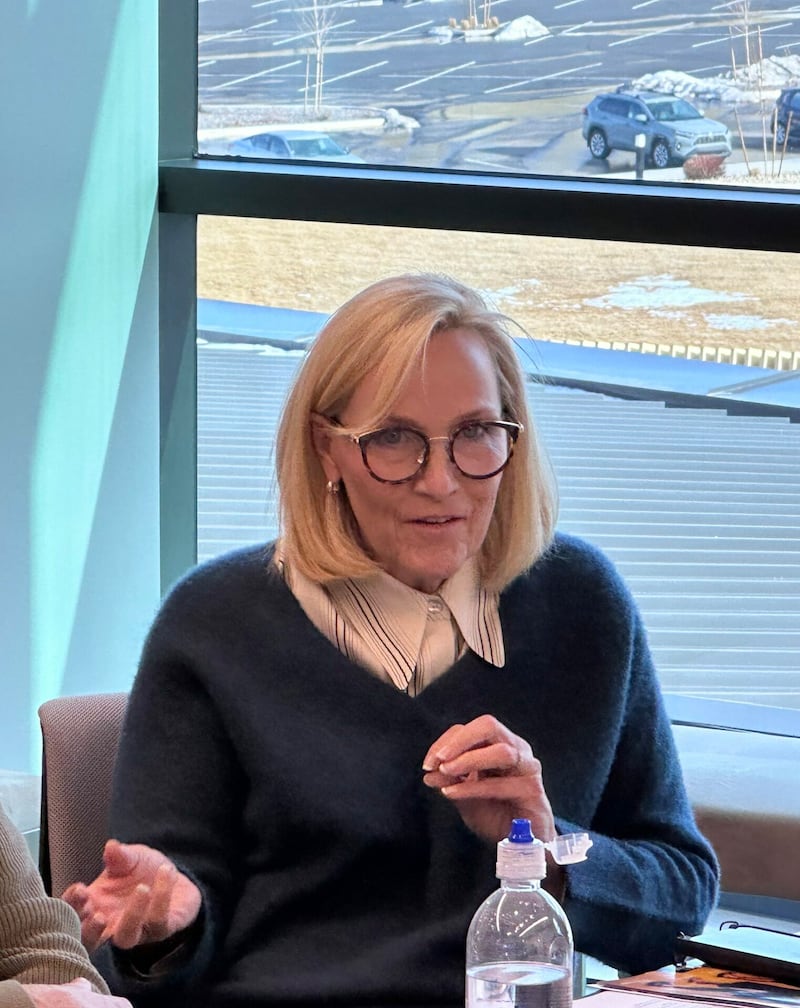
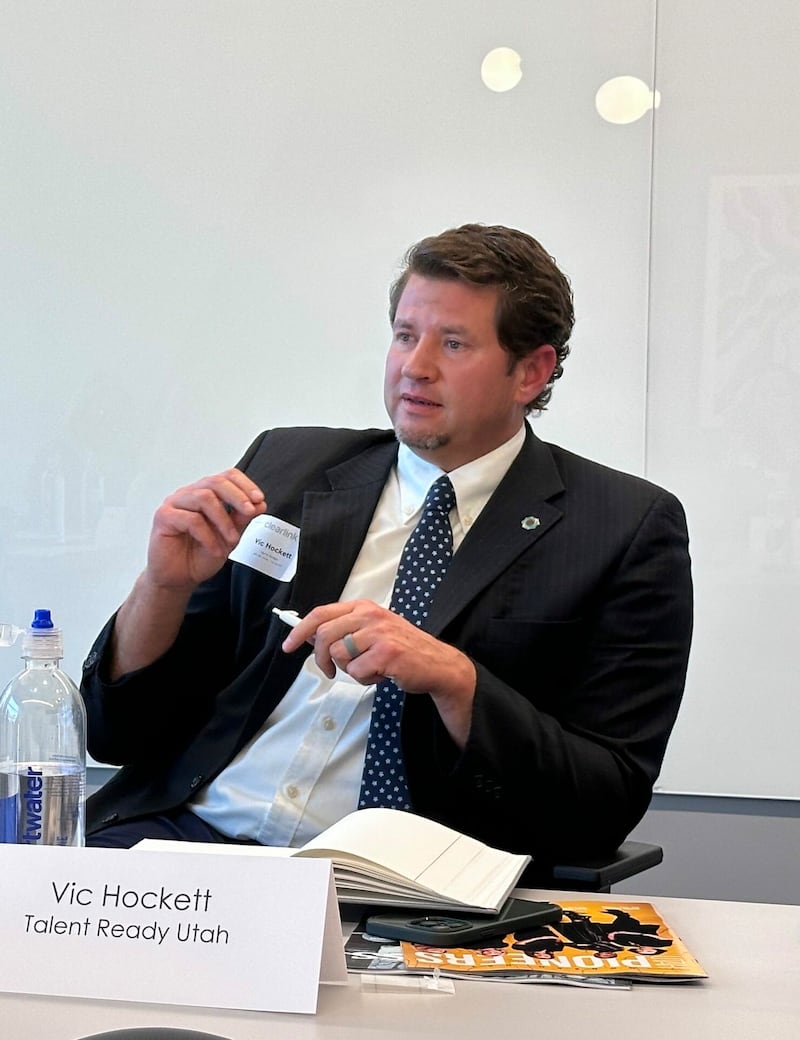
What can we do to help improve retention rates for teachers in the state of Utah?
Carly Maloney | 2024 Utah Teacher of the Year | Viewmont High School, Davis School District
We have to continue having conversations about fair compensation and benefits. Many teachers have bachelor’s, master’s and doctorate degrees. I have several colleagues who can’t afford a house, even with a master’s degree. To retain teachers, we need to have competitive benefits and wages. We also need to compensate teacher leadership so people can lead from their classrooms, keeping quality teachers in the classroom.
Kristin Hadley | Dean & Professor, Moyes College of Education | Weber State University
If you look at some of the highest-ranking education systems in the world, teachers are teaching for maybe 20 hours a week maximum, and then they have the rest of the time to mentor, shadow, prepare, collect data and fill out paperwork. If teachers are required to be on for at least six-and-a-half hours a day with kids, that’s a recipe for mental health challenges.
We also need to push back dramatically on the idea that anybody can teach. All of the studies show that is completely untrue. The most highly qualified teachers have the best results with children. In fact, one year with a highly qualified teacher can make a huge difference in the life of a child. If a child is having year after year of less qualified teachers—teachers who don’t know how to teach, don’t understand pedagogy and don’t know how to reach a child in a way that gets them excited and motivated to learn—then we’re doing a huge disservice. Being well-prepared is a huge piece of retention for teachers, and we have lots of data to support that.
Christine Ivory | Co-Founder | The Clark & Christine Ivory Foundation
Every “female” profession—nursing, mothering, teaching—has been so devalued and continues to remain devalued, not just by men but by women. If this group could change that, we would have done something incredible. Those professions save everyone. The domestic life is life. Your life is nothing if your domestic life is chaotic and ridiculous. We have created a society where many parents have three jobs trying to keep food on the table. But if parents aren’t preparing students, it makes a teacher’s job a living nightmare. If we can elevate nurturers, that is a move toward a solution. Parents have to be a part of the teaching solution.
Even before COVID-19, we saw a decline in higher education enrollment across the U.S. What’s causing that? What do we do about that?
Vic Hockett | Associate Commissioner | Talent Ready Utah, Utah System of Higher Education
We are fighting a national narrative that may not actually exist in Utah. We need to better understand our state’s landscape, industry partners and parents to have a better understanding of what exists in classrooms here. Right now, we are putting together a study to identify what the Utah narrative actually is. Although some people don’t think our technical colleges are colleges, they are. Just this morning, we were presenting to the legislature on an apprenticeship expansion request. We’re creating apprenticeships in tech and health care and diesel—across the spectrum—because more and more employers are interested in skills-based learning.
Christine Ivory | Co-Founder | The Clark & Christine Ivory Foundation
In conversations that I’ve had with people coming from the University of Utah, they’re very concerned about how critical the legislature has been. The agenda of higher education is [seen as] liberal. It’s a very political issue right now.
Kristin Wright | Programs Director | Women Tech Council
College is expensive, but if you’re planning ahead, there are ways to be creative around it. We can learn from other states who have been creative around the cost of college. In Florida, they have a program where if you enroll in the program the year your child is born, you’re locked into that tuition rate for that year. There are ways to be creative.
Natalie Okeson | Executive Director | Labor & Honor Foundation
VP, Corporate Responsibility & External Affairs | Clarke Capital Partners
I’d like to push back on the idea that the only things that matter in higher education are the hard skills. We do ourselves a disservice when we only focus on hard skills. General courses, which sometimes get dismissed, develop very important skills for the actual workforce setting and are critically important.
Abby Cox | First Lady | Utah
Higher education has done a bad job of telling their own story. I hear from businesses all the time, “I can teach a kid how to code. I can’t teach a kid how to work in a diverse group or connect with other people on the team that have different points of view.” To tell the right story, higher education has to promote the critical, durable skills it can teach. Those skills, I would argue, are equally—if not more—important.
Liz Findlay | Co-Founder | Albion Fit
I recently visited the Lassonde Entrepreneur Institute and was so impressed. They have sewing machines, letterpress machines … I love how interdisciplinary it is. We need to broaden our children’s horizons and show them the opportunities for growth and knowledge. Universities should create spaces for students to be able to test the waters, meet different people and talk about different things.
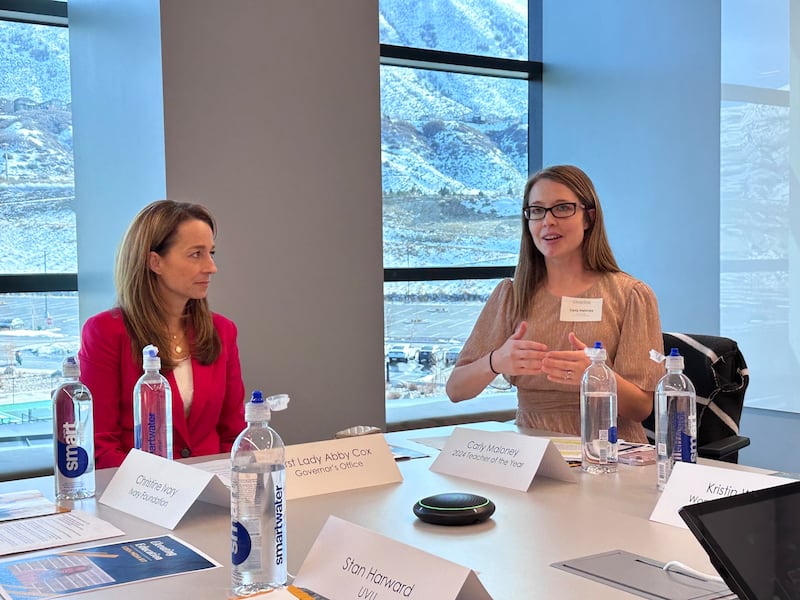
How do we improve a more rapid return on investment for students in higher education?
Holly Peterson | VP, Instruction | Mountainland Technical College
Twenty years ago, technical education wasn’t seen as a worthy endeavor. Now, technical education is very well-supported; the buildings are beautiful, the equipment is great, and people who were directed to universities before are now directed to technical education and do better in that environment. We’re not seeing declining enrollments in technical education. We work with a lot of employers that are willing to take students without degrees if they have a technical certificate. Texas Instruments will now hire people out of our programs with the certificate, and Texas Instruments is paying for their degrees as they continue to go to school; that’s a good value proposition.
Vic Hockett | Associate Commissioner | Talent Ready Utah, Utah System of Higher Education
There are more and more employers leaning into skills-based learning. Many companies no longer require full degrees to take on amazing jobs. We are aligning the levels of education required with the occupation, and more of that development is being done at our technical colleges and universities. One of our biggest opportunities to change the value proposition of higher education is to align programs with what employers need.
How can we better support a diverse and diversifying population here in Utah?
Kristin Hadley | Dean & Professor, Moyes College of Education | Weber State University
I come from an open-access institution. Our students come in at all different levels of need, and our mantra is, “We take them where they are and get them where they want to go.” That looks different for every person. Some students need very little support. Other students have no idea. There’s a sentiment that if we give something to one person, we have to give it to everybody. That’s silly. Not everyone needs it. We need to provide it for those who need it.
Anneliese “AP” Pixton | Founder | Ed Tech Consulting
I put this question out to every teacher I know. To summarize, they said, “If we center the needs of our students who are least effectively served, we’ll be on the right track to effectively serving everyone.”
Carly Maloney | 2024 Utah Teacher of the Year | Viewmont High School, Davis School District
I work with multilingual learners, and we had the opportunity to work with a first-grade teacher in one of our feeder schools—our students became pen pals. At the end of the year, we took that classroom breakfast. We read books with them, and my students taught them songs, games and different activities from different countries. We need to connect students in the classroom as much as possible. These groups feel marginalized, but if we can help them understand what their strengths are and what they add, that’s a game changer.
Stan Harward | Associate Dean, School of Education | Utah Valley University
One of the biggest areas where our alumni struggle is working with multi-language learners. It’s one thing to help them feel involved and included, but it’s another thing to sit down and teach them reading or science. You could be the greatest, nicest, most wonderful teacher in the world, but you’ve got to have the skills to know how to teach reading to somebody who’s struggling; it takes real expertise. We need to lift the skill level of our educators to be able to do that.
What are your perspectives on AI in education?
Anneliese “AP” Pixton | Founder | Ed Tech Consulting
We’re hearing that our K-12 educators are not ready for AI, but they are. They just need a lot of support. We have some of the most brilliant minds in AI engineering in Utah. I’m so glad those voices are interested in what’s going on in education and are developing tools for the classroom, but it’s important that we amplify educators’ voices—from a learning and development standpoint and from a child advocacy standpoint. AI will go one of two ways. If educators take hold of it, I believe teaching could become one of the highest-paid and highest-respected professions in the world. They won’t be babysitters, paperwork pushers or building managers. Teachers will be true facilitators for everyone who goes out into the world to do everything else. Subject matter will matter less. The learning and development skills people learn will matter so much more.
